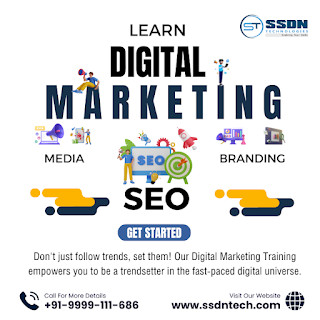How does pay-per-click (PPC) advertising work, and what are its advantages and disadvantages?
In the bustling world of digital marketing, where every click counts, Pay-Per-Click (PPC) advertising stands as a prominent beacon of opportunity. If you're considering enhancing your digital marketing skills or seeking to understand how businesses leverage online platforms for targeted advertising, understanding PPC is crucial. Aspiring marketers in Gurgaon, often seeking comprehensive training from a reliable Digital Marketing Training Institute in Gurgaon, must grasp the essence of PPC advertising to stay ahead in the game.
Understanding How PPC Works
At the heart of PPC lies a simple concept: advertisers pay a fee each time one of their ads is clicked. It's a way of buying visits to your site, rather than attempting to "earn" those visits organically. Search engine advertising is one of the most popular forms of PPC, where advertisers bid for ad placement in a search engine's sponsored links when someone searches for a keyword related to their business offering.
For instance, if you're offering a Digital Marketing Course in Gurgaon, you'd bid to have your ad appear in the sponsored results when someone searches for "Digital Marketing Course in Gurgaon." The placement of your ad typically depends on the competitiveness of your bid and the relevance of your ad to the search query.
Advantages of PPC Advertising
Instant Visibility: Unlike organic methods that take time to gain traction, PPC offers instant visibility. Once your campaign is set up, your ads can start appearing on search engine results pages, driving immediate traffic to your website.
Targeted Reach: PPC platforms allow you to target specific demographics, locations, and even devices. This level of targeting ensures that your ads reach the most relevant audience, increasing the likelihood of conversions.
Measurable Results: PPC provides comprehensive data and analytics, allowing you to track the performance of your ads in real time. You can monitor metrics such as clicks, impressions, conversions, and return on investment (ROI), enabling you to optimize your campaigns for better results.
Budget Control: With PPC, you have full control over your advertising budget. You can set daily or campaign-specific budgets, ensuring that you never exceed your financial limits.
Disadvantages of PPC Advertising
Cost: While PPC offers instant results, it comes at a cost. Clicks can be expensive, especially for highly competitive keywords. If not managed effectively, PPC campaigns can quickly eat into your marketing budget without delivering the desired results.
Complexity: Managing PPC campaigns requires a certain level of expertise and understanding of the platforms and algorithms involved. Without proper knowledge and optimization, you may end up wasting resources on ineffective campaigns.
Dependency on Platforms: PPC advertising is reliant on third-party platforms such as Google Ads or Bing Ads. Any changes to their algorithms or policies can impact the performance of your campaigns.
Click Fraud: Click fraud remains a concern in PPC advertising, where competitors or malicious entities click on ads to drain your budget without generating legitimate traffic or leads.
Conclusion
In conclusion, PPC advertising offers a potent avenue for businesses to amplify their online presence and drive targeted traffic to their websites. However, it's essential to weigh the advantages against the disadvantages and approach PPC with a well-thought-out strategy. Aspiring digital marketers in Gurgaon looking to master the intricacies of PPC advertising can benefit immensely from enrolling in a reputable Digital Marketing Certification Course in Gurgaon. With the right skills and knowledge, they can navigate the dynamic landscape of PPC and harness its potential to propel businesses towards success in the digital realm.
Website:- https://www.ssdntech.com Contact Number:- 9999111686




Comments
Post a Comment